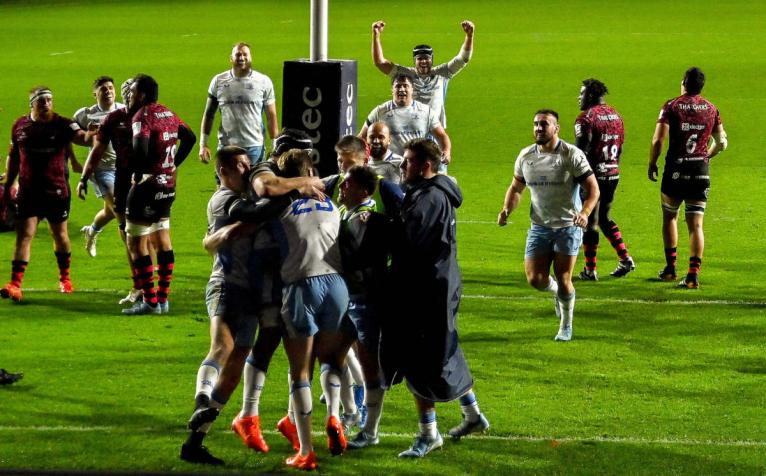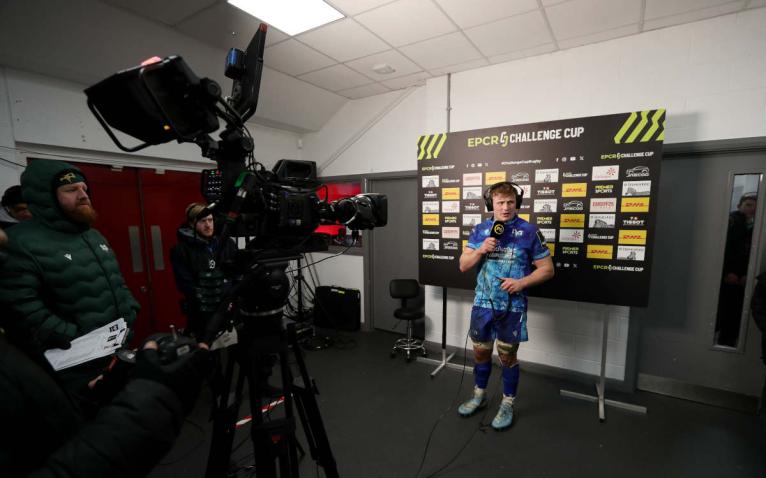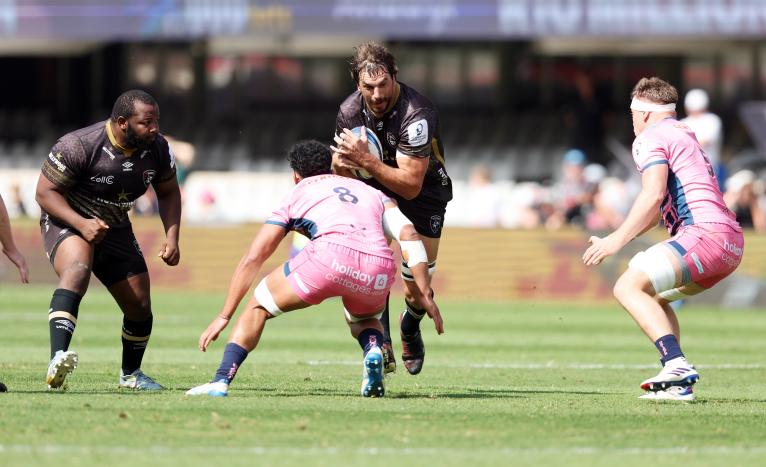Not exactly an intoxicating opening as the 2024/2025 Investec Champions’ Cup laced up its boots and reached for its gum-shield last weekend; Leinster, Stade Rochelais and Union Bordeaux-Bègles all cleaning the clocks of the top three in the Gallagher Premiership and Stade Toulousain reducing Ulster to dust and pebbles. Who could have guessed? Well, precisely. Perhaps the competition should just spool to the semi-finals and save itself five months.
Death, Famine, War and Conquest: the bookmakers aren’t alone in thinking this is, again, a race of four apocalyptic horsemen. And with good reason. At a rough count, Stade Rochelais and Union Bordeaux-Bègles between them boast some 40 or so internationals, none of whom looks obviously malnourished nor appears to be struggling to find his way to the weights’ room. Stade Toulousain, for their part, have four Test full backs on their books. Ange Capuozzo’s injured? Blair Kinghorn needs a lie down? Juan Cruz Mallia’s a little out of sorts? So, what are you saying, we’re lumbered with Thomas Ramos this Saturday? Alors, I guess we’ll just have to manage.
And then there’s Leinster, who’ve snagged RG Snyman to bolster a second row of deadbeats like James Ryan, Joe McCarthy and Ryan Baird; not forgetting Jordie Barrett buttressing a makeweight midfield of Robbie Henshaw, Garry Ringrose and Jamie Osbourne. And there we all were wondering why Harlequins are 100/1 to win the tin. Wonder no more. Bucks buy beef and neither is easily gainsaid.

All of which leaves us with a tournament where gratification, once again, looks like being seriously delayed. Sports-wise, there’s nothing new in this, certainly if you buy into the oft-repeated mantra that the US Masters doesn’t start until the back nine on Sunday. Or, indeed, if you look at the Wimbledon Men’s Singles and realise that the last 21 titles have been shared between five guys. And you don’t hear too many folk chirping about either of these events being ‘diminished’.
But the Champions’ Cup is taking a bit of a slapping, not least from those who insist nostalgia ain’t what it used to be. Perhaps we shouldn’t get too misty-eyed here. ERC’s Heineken Cup was never flawless. The pool stages, arguably, chewed up too much calendar and, too often, threw up too many dead rubbers. But, at least, there was a bunfight for qualification, a deliciously, user-friendly format and, more prosaically, a tournament that was ‘well packaged’. Alas, none of this appears to apply now.
Eighty per cent of the Gallagher Premiership qualifies automatically for this season’s Champions’ Cup. None has a serious sniff of winning the thing.
Eighty per cent of the Gallagher Premiership qualifies automatically for this season’s Champions’ Cup. None has a serious sniff of winning the thing. On top of this, the pool stages are a bugger to decipher and riddled with anomalies. And in terms of the broadcasting deal in the UK and Ireland, the organisers this season, as one TV insider somewhat unkindly put it, ‘have effectively signed a deal with Ryanair.’ More of this anon.
In fairness, you have some sympathy here with EPCR, struggling as they are to balance (a) the integrity of the competition (b) the logistics of a tournament spanning two hemispheres (c) teams with either bulging wallets or budgets thinner than a sparrow’s shoelace (d) the constrictions of the rugby calendar and (e) the commercial viability of the entire enterprise. This is why, when you invite a committee to sit down and build a horse, you invariably end up with a camel.
An absolutely perfect crossfield kick from Antoine Dupont! 😍
A beautiful Toulouse try finished by Ange Capuozzo 🔴#InvestecChampionsCup pic.twitter.com/V3tUb8ShBr
— Premier Sports (@PremSportsTV) December 8, 2024
But given what EPCR promised back in 2014 post The Great Schism, it’s been a ho-hum decade. Back then we were told that the shiny new competition would generate 75%-100% more revenue than ERC yet, in 2022, their title sponsor – Heineken – was reportedly paying 25% of what it divvied up a decade earlier. Again back in 2014, it was said that a revamped tournament would help more Welsh regions make it to the quarter-finals; ten years later, Wales’ involvement starts and stops with staging the final.
The TV deals speak volumes. Back in the day, Sky Sports invested lavishly in the Heineken Cup; boots on almost every ground and an almost ruthless promotion of a tournament that paid back in spades. But when Sky Sports lost the rights, the tears of the rugby production team were water off a duck’s back to the guys on the third floor with the potted plants and the glass offices. Why? Because in their view, the extra money EPCR were chasing bore no relation to the eyeballs tuning in. Test rugby shifts the needle; club rugby doesn’t. Tattoo this behind your eyelids.
If your estimation is that all the punters are interested in these days is the sex, then why waste a bundle of money on the foreplay or a packet of post-coital cigarettes?
Now, fast forward a decade. TNT – BT as was – did a cracking job with the product. But, like Sky Sports, it seems they eventually felt the money being demanded didn’t square with their estimation of the commercial broadcast value. As we hear it, when TNT baulked at a price increase on a new deal, EPCR hawked the UK rights elsewhere, got no takers and went back to TNT, only to find they’d now earmarked their cash for the more lucrative Test arena, specifically, the recent, compelling Autumn Series and, if you believe the whispers, a big pitch for the 2026 Six Nations. So, no, thank you. Thus did the tournament end up on Premier Sports.
Which, in turn, brings us to the ‘Ryanair’ jibe. You’ll have to trust me here but I guarantee that every man and woman on Premier Sports’ coverage will be an experienced operator working their socks off. It’s a tough gig and nothing less will suffice. But if you look at the broadcast specification – cameras, graphics, analysis – it’s clearly a no-frills operation compared to the money that was being spent a decade ago.
And perhaps wisely so. If your estimation is that all the punters are interested in these days is the sex, then why waste a bundle of money on the foreplay or a packet of post-coital cigarettes? It wouldn’t be my argument but you can spend only what’s in your purse and, so far certainly, it ain’t easy to hear either bells or whistles.

For many, of course, the Premier Sports deal is plumb perfect, effectively a freebie if you already shelled out for the URC and the Top14. But England – and, like it or not, English rugby makes up a chunky proportion of the audience – appears to be reluctant to take on another direct debit, however competitively priced, to watch a tournament none of its teams has the clout to win. Sadly, it’s not only a parochial view but highly damaging for the tournament.
South Africa. Are they adding to the party? Well, collectively, they’re the World Champions so, I guess, there’s your answer. But given the geography, the logistics and the identity of a European tournament, do they actually belong here? It’s a moot point, no question, but increasingly an irrelevant one. Once the toothpaste is out of the tube, good luck trying to put it back in.
And while we may have Four Horsemen, this isn’t quite an apocalypse just yet. You have high hopes of Glasgow this year? Me, too, but the emphasis has to be on the word ‘hopes’. The Sharks? Likewise, although perhaps less so if Eben and Ox are flying to the East Midlands this weekend in cattle class via Qatar and Amsterdam. Saracens? Pedigree, no question, but not quite the snarl of old. Munster? One quarter-final in the past five seasons and this from a team who, as much as anyone, made this tournament what it is. Or, arguably, what it was. And thereby hangs the tale.
The front end of the tournament is The Big Issue. Consider this: 12 matches on the opening weekend produced one – just one – losing bonus point and, over the three days, an average twenty-point winning margin per match.
Look, the back end of the competition remains a banquet, albeit with an increasingly familiar menu. Indeed, the last four finals have featured just three teams and you wouldn’t readily bet the farm – or even the chicken shed – against two of those lining up again in Cardiff next May. But for comparative purposes, the Gallagher Premiership has been won by five different teams in the past five seasons; the URC, four in four. Variety is always more spicy.
But the front end of the tournament is The Big Issue. Consider this: 12 matches on the opening weekend produced one – just one – losing bonus point and, over the three days, an average 20-point winning margin per match. And as sublime as it is to plump yourself onto the sofa for an afternoon to enjoy Dupont, Kolisi, Bielle-Biarrey and Barrett eating someone else’s lunch, what you’re too often watching – nay, paying for – are catchweight contests.

The obvious answer, I suppose, is that less equals more, a concept rugby has too often struggled with given the understandable imperative of generating revenue. But if you’ve 24 teams in a tournament where only four have a genuine chance of winning it, four others have an outside shot and the remaining sixteen simply haven’t the heft to contend, then you’re struggling, the more so when the calendar leaves you pouring quarts into pots of pints. Most obviously, you have too many teams.
So has EPCR turned wine into water this past decade? Harsh. Certainly, if there were a simple solution, we’d presumably be wearing it right now. But, clearly, their estimation of the value of their product – not least the TV value – isn’t shared by the broadcasters or by increasingly large numbers of the rugby public. The drawing board beckons.


Trop d'équipes sont qualifiées d'office.
La seule formule viable est la suivante :
4 équipes par ligue + les 2 champions des coupes précédentes.
Puis,
2 poules de 7 équipes et 4 qualifiés en demi finales, puis finale.
Soit un format plus concentré permettant de traiter les problèmes de logistiques sur 2 hémisphères, libérer des dates pour le repos des joueurs et gagner en attractivité pour le public et les diffuseurs.
CQFD
Entitlement is the issue here, entitlement from the English and French leagues to those guaranteed places but the difference is, the French have been able to back it up. There needs to be a stronger meritocratic basis for Champions Cup qualification, regardless of which league the teams are from.
And ofc that means greater risk for the English teams, and potentially the French too over time…
Spot on